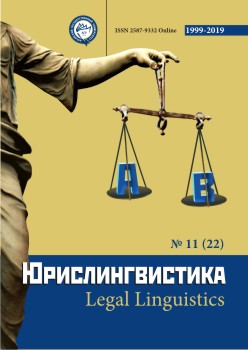THE ANALYSIS OF THE PRECEDENT EXPRESSION WITHIN FORENSIC LINGUISTIC EXPERTISE: RUSSIAN AND INTERNATIONAL EXPERIENCE
Abstract
The discussion on the relevancy of linguistic expertise of precedent expressions looms large in contemporary scholarly discourse. On the one hand, precedent and metaphorical expressions are often cases at legal proceedings. On the other hand, linguistic phenomena of this kind often cause difficulties in for linguistic expertise, because it is more difficult to formalize the lexico-semantic level of the language than the phonetic, morphological or syntactic levels.
Both Russian and foreign linguists have experience in performing expertise of such expressions. The article discusses two examples of the analysis of statements containing vocabulary with a figurative meaning, one of which demonstrates the peculiarities of linguistic expertise of precedent expressions in British judicial practice, and the second one reflects the experience of considering similar phrases in Russian linguistic expertise. The peculiarities of linguistic expertise in both countries are caused by differences in the expertise procedure and the tasks that the court sets for the expert.
In Britain, the question of whether a metaphorical precedent expression is defamatory or not is determined through a two-step process. At the first stage, the judge decides whether the expression in question may potentially contain libel. The decision is made on the basis of the so-called “ordinary reader test”. At the second stage, the claimant gives his arguments, and then the burden of refutation of the arguments of the claimant passes to the respondent, who must convince the judge and / or jury that the phrase in question contains truthful data. The linguist’s help is involved only at the first stage of the legal process. In Russian practice, however, a linguist must consider a form of expressing negative information and answer the question whether a precedent expression can be part of a factual statement.
Downloads
Metrics
References
Баранов А.Н. Cкрытое (имплицитное) утверждение в лингвистической экспертизе текста. URL: http://konference.siberia-expert.com/publ/baranov_a_n/1-1-0-55.
Будаев Э.В., Ворошилова М.Б., Руженцева Н.Б. Эволюция лингвистической экспертизы: методы и приемы. Екатеринбург, 2017.
Федеральный закон от 31 мая 2001 г. N 73-ФЗ «О государственной судебно-экспертной деятельности в Российской Федерации».
Durant A. Allusions and other 'innuendo' meanings in libel actions: the value of semantic and pragmatic evidence. Forensic Linguistics. 1996. Vol 3, No 2.
References
Baranov, A.N. (2018). Skrytoe (implitsitnoe) utverzhdenie v lingvisticheskoy ekspertize teksta. Available from: http://konference.siberia-expert.com/publ/baranov_a_n/1-1-0-55 (in Russian).
Budaev, E.V., Voroshilova, M.B., Ruzhentseva, N.B. (2017). Evolyutsiya lingvisticheskoy ekspertizy: metody i priemy. Ekaterinburg (in Russian).
Federal'nyy zakon ot 31 maya 2001 g. (2001). 73-FZ “O gosudarstvennoy sudebno-ekspertnoy deyatel'nosti v Rossiyskoy Federatsii” (in Russian).
Durant, A. (1996). Allusions and other 'innuendo' meanings in libel actions: the value of semantic and pragmatic evidence. Forensic Linguistics, 3(2), 195–210.
Copyright (c) 2019 Эдуард Будаев

This work is licensed under a Creative Commons Attribution 4.0 International License.
The authors, which are published in this journal, agree to the following conditions:
1. Authors retain the copyright to the work and transfer to the journal the right of the first publication along with the work, at the same time licensing it under the terms of the Creative Commons Attribution License, which allows others to distribute this work with the obligatory indication of the authorship of this work and a link to the original publication in this journal .
2. The authors retain the right to enter into separate, additional contractual agreements for the non-exclusive distribution of the version of the work published by this journal (for example, to place it in the university depository or to publish it in a book), with reference to the original publication in this journal.
3. Authors are allowed to post their work on the Internet (for example, in a university repository or on their personal website) before and during the review process of this journal, as this may lead to a productive discussion, as well as more links to this published work (See The Effect of Open Access).











